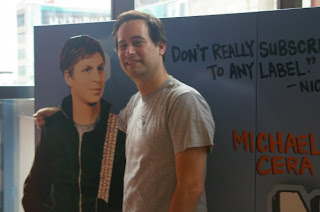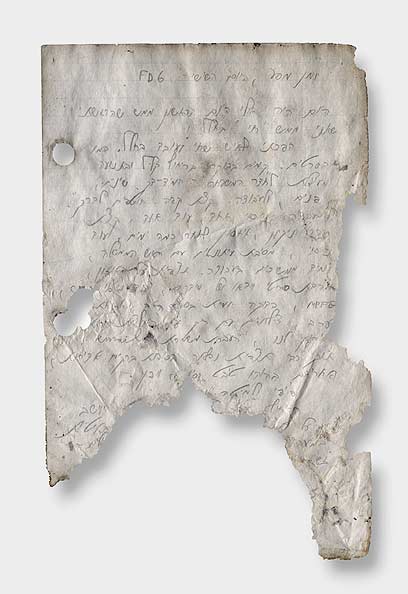
You'd think an
etrog in Hasidic Brooklyn would be easy to find.
After all, when I lived in San Francisco (Jewish population: high; etrog population: maybe 2 dozen or so?), choosing an etrog was easy to select: your synagogue (Chabad, because nobody else wanted to bother with ordering them) would get a box of etrogim in the mail, and choosing an etrog would be pretty simple: the first person in line got the first etrog out of the box.
If you've ever seen the (best) film (ever)
Ushpizin, you know that choosing an etrog can be involved, strenuous, even obsessive. Everything from the color to the texture to the bumps means something -- a tiny horizontal indentation toward the bottom curve, for instance, is known as "Eve's Bite," since one school of thought says that the etrog was the fruit that caused Adam and Eve got kicked out of the Garden of Eden. And let's not underestimate the prime fact: Jews are obsessive-compulsive about, well, everything.
So here's me on Sunday, going through every one of the dozen etrog shops that spring up in Crown Heights for exactly a week and a half, transformed bodegas and corner stores and even one barbershop. The only thing I really know is that I like to have a pitom, that tiny stem that looks like an outie, on top of mine. And it just so happens that, among Chabad, people try
not to have a pitom.
I went into my friend Levi's family's store, set up in the neighborhood matzoh bakery. They always somehow forget they know me until I've caused them even more stress than the last time, upon which they're like, "Oh.
You.." and vanish to another room. But they're actually really nice. In this instance, they were almost out of pitomified etrogim, except for....
"These are Moroccan, but you probably don't want them."
"Moroccan?" My synagogue is Moroccan. My eighth-grade term paper was on Morocco. I
love Morocco.
"Moroccan. They're not like Israeli or Italian etrogim; they're kind of, how do you say,
shvach. Lazy etrogs."
"They are lazy etrogs," I repeat, understanding not at all.
He explains. They're solid, sturdy etrogs, lacking in beauty and bumpiness, all the things we are supposed to treasure in etrogs. They're mostly sold to children, to teach them how to say the blessings and how to handle an etrog, and all that. "You know," he says, "the pitom, it does not last long around the children." Then he looks down at my daughter, who's strapped to my chest in one of those portable baby prison things, and says "You have one year left, maybe two."
I went to another place, and the next. One place, I was fighting to see etrogs, not wanting to jump straight in and endanger my kid. At other places, the etrogs didn't have pitoms, were too expensive (hey, hauling delicate and uncommon citrons from across the world ain't cheap) or just weren't the right etrog.
The last place was around the corner from my house, a convenience store that had literally been taken over a week ago. Mexican beer ads with women who couldn't have been wearing fewer clothes if they were naked littered the floor, mixed with somewhat fresher newspaper fragments in Hebrew. Teenage Israelis were running in and out like worker ants, and it took about half an hour of having a twenty-dollar bill in my hand for someone to notice.
He gave me a shrug, almost imperceptible beneath his huge shoulders. He gestured over to a bunch of huge boxes strewn across the floor, all of which had literally hundreds of smaller boxes -- etrogs -- inside each.
I got on my knees. I started poring through them.
Now my daughter is usually an active girl. She struggles, she blips and beeps and chortles, she crawls pretty much everywhere and she puts nearly everything into her mouth. Today, though, she was kind of dreary -- either because she didn't get a full nap, or from the tedium of seeing a zillion men in bushy beards and black hats, one after the other. She watched me poking through the etrogs with a modicum of disinterest, head lolling to one side. She didn't even feel like eating the corner of the Baby Bjorn, which she's usually pretty nonstop about doing.
And then I unwrapped it. It didn't look that special to me, although it certainly didn't look like any of the normal ones -- tilted to one side, the pitom sturdy and washed to the other, waves of green peeking through the yellow to the top and bottom. I was thinking of putting it back, digging through the rest of the box. I'd already spent an hour; what was another twenty minutes? But then my chest tugged at me, two tiny hands working their way inside the box. My daughter was awake in a way she hadn't been all day, cooing like a stoned dove and fighting styrofoam for possession of a fruit she'd never seen before. She gave an imminent tug, then looked straight up at me as if she was asking,
Can I eat it? Just this once?"This is the one," I announced -- to the room full of Israeli teenagers, none of whom was paying attention to me, and the manager, who didn't even realize what I was stuffing into his hand until the money was pressed deep inside, and I was halfway to the door.
And then I went home to shake my lulav.
crossposted on MyJewishLearning







 And, no matter
And, no matter 


 I think of God as an entity. I know I'm anthropomorphizing, and in my head, I'm always correcting myself -- think of it as the equivalent of an English teacher who knows how to speak textbook Shakespearean English but goes home and speaks in Ebonics. Further, in our tradition, there are some times when it's okay to actively anthropomorphize God -- when we say that God took us out of Egypt with "an outstretched hand," for instance. When we say that during Passover, is anyone thinking that a giant hand came down from the sky and just scooped the Children of Israel out of the desert?
I think of God as an entity. I know I'm anthropomorphizing, and in my head, I'm always correcting myself -- think of it as the equivalent of an English teacher who knows how to speak textbook Shakespearean English but goes home and speaks in Ebonics. Further, in our tradition, there are some times when it's okay to actively anthropomorphize God -- when we say that God took us out of Egypt with "an outstretched hand," for instance. When we say that during Passover, is anyone thinking that a giant hand came down from the sky and just scooped the Children of Israel out of the desert?

 It's been a long Thanksgiving weekend. I know, today's Monday and we're back in work mode, but it feels like the weekend isn't over yet. It was a hard holiday; harder for other people than for us, but thinking that doesn't make it any easier. At our Thanksgiving table was my cousin's boyfriend, who's from Mumbai and whose parents are safe, but who still hadn't heard from his friends; my wife, whose sister is scheduled to go on vacation in India later this week and who's still thinking of going; and all of us, most of whom aren't religious, though we've all been guests at a Chabad house at one point in our life or another.
It's been a long Thanksgiving weekend. I know, today's Monday and we're back in work mode, but it feels like the weekend isn't over yet. It was a hard holiday; harder for other people than for us, but thinking that doesn't make it any easier. At our Thanksgiving table was my cousin's boyfriend, who's from Mumbai and whose parents are safe, but who still hadn't heard from his friends; my wife, whose sister is scheduled to go on vacation in India later this week and who's still thinking of going; and all of us, most of whom aren't religious, though we've all been guests at a Chabad house at one point in our life or another.
 who isn't Jewish (actually, he's from Somalia, currently residing in Toronto) but whose name, K'naan, sort of has a Biblical ring to it, and whose mind-bogglingly good song "In the Beginning" definitely does.
who isn't Jewish (actually, he's from Somalia, currently residing in Toronto) but whose name, K'naan, sort of has a Biblical ring to it, and whose mind-bogglingly good song "In the Beginning" definitely does. 
 Speaking of praying: my
Speaking of praying: my  My new
My new 


















